9/17/18 The New Year Starts off on a Very Sour Note
Late last, night a funeral took place in the K’far Etzion cemetery. The burial was of American-born Ari Fuld, a 45 years old father of four, resident of Efrat (one of the oldest Jewish towns on the West Bank) who was brutally stabbed by 17-year-old Palestinian youth in a lone wolf attack. Fuld fought back, pursuing his attacker before succumbing to his wounds. A popular advocate of the settlers, Fuld was known by many on the right and left. His murder affected many. It was a brutal reminder that the status-quo will not remain the status-quo for long.
Last week, in an interview with the New York Times, Jared Kushner (President Trump’s son-in-law and the member of the administration officially responsible for negotiation of an agreement between the Palestinians and Israel) stated: “Nobody is entitled to America’s foreign aid.” Kushner was defending actions taken by the Trump Administration, in response to the seeming unwillingness of the Palestinians to engage the administration on their peace plan, following Trump’s recognition of Jerusalem as Israel’s capital and stating he “ took Jerusalem off the table”.
The Trump Administration first cut back aid to the Palestinian Authority, then curtailed US funding for UNWRA, followed by cutting aid to hospitals in East Jerusalem, then closing the Palestinian Authority’s mission in Washington, and finally, at the end of the last week stopping the $10 million in support the US provided for joint Israeli-Palestinian youth activities. According to Kushner, the administration's actions would increase chances for peace.
The Israeli right-wing, taking their cue from Prime Minister Netanyahu, have hailed the above mentioned US moves. Most of the right-wing has long considered the Palestinian Authority as the enemy, even though there is close security cooperation between Israel and the Authority, and although the Authority provides vital civil services to the Palestinian population in the West Bank. Others, such as Ehud Barak, former Prime Minister and Defense Minister says: “weakening the Palestinian Authority will make it collapse — and who will take its place — Hamas.”
Defunding UNWRA, which was established after 1948, is supported by most Israelis. UNWRA was created at the insistence of Arab States who refused to allow the regular UN refugees Agency (UNHCR) to deal with the refugees created by Israel’s War of Independence — since part of UNHCR’s mandate included settling the refugees in their new lands, which the Arab states opposed. Instead, the Arab states insisted that a separate agency be set up to assist refugees until they could return to their original homes. As Dr. Einat Wilf, former Labor Knesset Minister and author of a recent book on Palestinian refugees stated:
“Crucial step in building institutions of a Palestinian state is getting UNRWA OUT of [the] Palestinian Authority and dismantl[ing] all ‘refugee camps’ in its area. Sustaining idea that people born IN areas of the future state of Palestine are refugees FROM Palestine UNDERMINES state building.”
Despite Wilf’s enthusiasm for ending UNWRA, (under whose auspices the number of refugees, which initially numbered under 700,000 has not decreased — as was the case with refugees under the care of UNHCR — but has increased to over 5 million), many Israeli policymakers believed a more gradual approach to defunding UNWRA, with an alternative plan in place, would be more successful, if less Trumpian.
The determination to end funding for East Jerusalem (mostly Christian) hospitals was met by a little more head scratching in Israel — with few clear how or why that decision was made. However, the ruling that seems most irrational is the decision to stop supporting youth programs between Israeli and Palestinian. As former US Ambassador to Israel under President Obama, Dan Shapiro wrote:
“The US decision to end grants for people-to-people programs that bring Palestinians & Israelis together (for sports leagues, environmental initiatives, etc.) is nonsensical. These programs build constituencies to support peacemaking and who view the US as their partner. No logic!”
Kushner indicated that the American peace plan is almost ready and he believed that eventually, the Palestinians would engage with the administration regarding the plan. Kushner continued: “In every negotiation, I’ve ever been in,” he said, “before somebody gets to ‘yes,’ their answer is ‘no.’”
To many the above-mentioned thinking is the essence of the problem with the Trump Administration’s approach to the Middle East conflict and most likely impacts other issues around the world. Kushner relies on his experience — which, like his father-in-law is solely in one area — i.e. real estate. To the Trump Administration, every deal is a real estate deal, and to Kushner and his negotiating team settling the Israeli-Palestinian conflict is as simple as closing a real estate agreement. Thus, to them, the solution to what they see as Palestinian recalcitrance is to create financial pain, to force the other side to come to the table and agree.
Unfortunately, International relations are not as simple as a real estate deal. Between 1739 and 1748 the British and Spanish fought a war, precipitated because the Spanish cut off the ear of a British captain, thereby staining British honor. History is replete with wars started and settled over national honor, not to mention religion. Whether examining the Trump Administration’s trade policy with China, or its relationship with the Palestinian, the administration’s inability to recognize that international relations are more complicated than a real estate transaction is wreaking havoc across the globe. The Trump administration’s need for public bombastic declarations and actions, instead of quiet diplomacy is counterproductive, and is unlikely to help achieve many if any of its stated goals.

 >
>